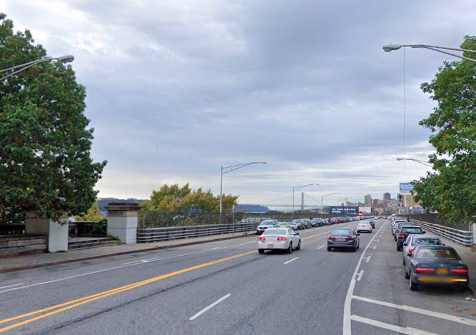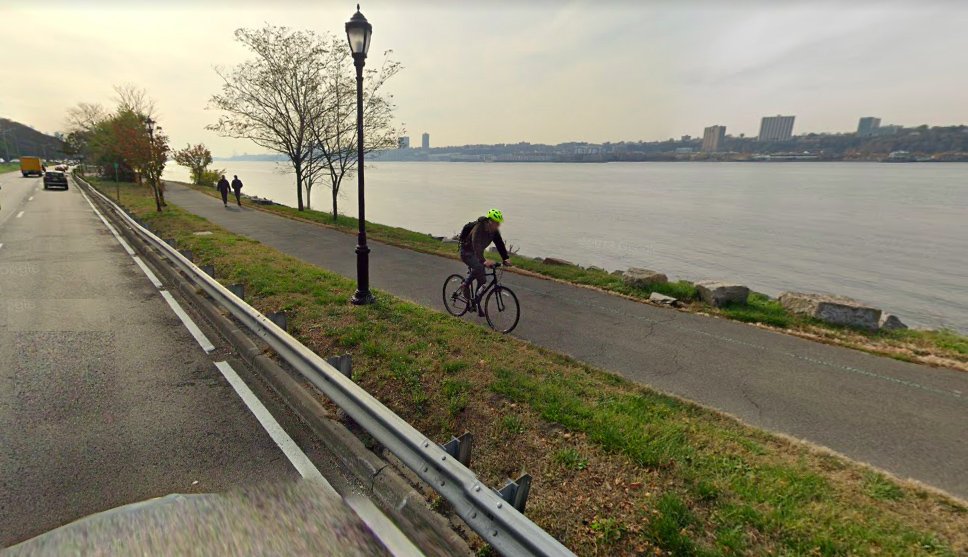The Parks Department will abruptly shut down a portion of the Hudson River Greenway — the continent's busiest bike path — starting on Monday, Sept. 28 with no provisions for safety for riders who must make an elaborate and extensive detour onto neighborhood streets.
First the news: Late on Friday, the Parks Department announced that it would close the Cherry Walk path in Riverside Park between W. 100th and W. 125th streets, citing the need for "planned shoreline and path reconstruction work" to fix damage caused by Superstorm Sandy in 2012.

The agency's statement about the work — which is being done "out of an abundance of caution" — added that Parks would not be doing anything to ensure the safety of cyclists beyond posting "signs" alerting riders that they have to find another route between the entrances to the pathway at W. 100th Street or W. 153rd Street:
To accommodate pedestrians and cyclists, Parks will post signs at related path entrances, south and north of the greenway, notifying them of the detour path. Visitors will be directed to exit the greenway at 100th St. to access alternative paths and local streets [Emphasis added]. Cyclists may re-enter the greenway at West 153rd Street and Riverside Drive via the Herman “Denny” Farrell Pedestrian Bridge.
No end date for the repairs was announced, but the agency later told Streetsblog that the work would take three weeks.
(The Department of Transportation, which might be expected to provide safe passage for cyclists outside the cozy confines of Riverside Park, did not get back to us with answers to our questions.)
The detour is not nearly as safe as the park for cyclists, especially cyclists who are accustomed to biking only in ... a park, as some pointed out on social media:
The Parks Department claimed in an email that the detour was made in conjunction with representatives of the cycling community, including representatives from Bike New York, Streetopia UWS, and StreetsPAC.
But it's unclear if the "conjunction" meant actual listening.
Streetopia UWS Director Lisa Orman told Streetsblog that there should have been better coordination among city agencies so that such work could be "accompanied by a quick-build protected bike lane on Riverside or Broadway."
"With enough advanced warning, DOT and Parks can coordinate this and give bicyclists the safe options that they deserve," she said.
And StreetsPAC's Eric McClure didn't exactly give the city high marks for its poor planning, either.
"The detour route does underscore the city’s failings in building out a true on-street protected bike network," he said. "There’s no reason that Riverside Drive needs four motor-vehicle lanes and two parking lanes to the detriment of a protected bike path."
The work is part of a $1.5-million, federally funded reconstruction project in Riverside and Fort Washington parks to restore the shoreline and repave the bike path. When it was discussed earlier this year, Streetsblog discovered that the Parks Department had kept the DOT out of the loop.
It's not the first time that the Parks Department has engineered a major shutdown of the Hudson River Greenway — which is the busiest bike path in North America.
Last year, the agency built a substandard bike path between 72nd and 83rd streets as a bypass to keep cyclists and pedestrians from mingling along a busy stretch of the waterfront bike path. At the time, a source in city government said the bike path was not built to proper standards, nor with DOT approval.
“They totally went rogue,” the city government source said. “Best bike lane in the city … and they just don’t give a fuck. They are discouraging cycling.”
The work on the Cherry Walk continues that pattern.
“This particular case is, sadly, part of a pattern where Parks’ actions and attitudes towards bicyclists appear ambivalent, at best, and, more frequently, downright hostile. From the thoughtless and shoddy condition of the Riverside Park detour to the lack of care for the safety of bicyclists at the Rotunda to the hostile way that Parks discourages bicycling across legal paths in Central Park, all of this leaves bicyclists feeling like they are an unwelcome nuisance in our parks,” Orman said earlier in the year.






